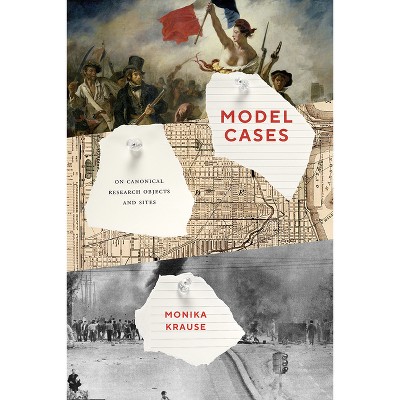Sponsored

The Good Project - by Monika Krause (Paperback)
$30.00
In Stock
Eligible for registries and wish lists
Sponsored
About this item
Highlights
- NGOs set out to save lives, relieve suffering, and service basic human needs.
- About the Author: Monika Krause teaches sociology at Goldsmiths, University of London.
- 240 Pages
- Social Science, Sociology
Description
About the Book
The sufferings of people around the world invite humanitarian intervention, but in practical terms it s not possible to help everyone. Who gets help, and who does not? Krause reveals here the constraints and organizational routines in NGOs that determine the answer to this question. Hers is the first sociological study of NGOs (such as the International Red Cross, Doctors without Borders, Oxfam, CARE, Save the Children). She discovers that the first priority of NGOs is not to help those in need, as such, but to produce projects. Managers try for good projects and, since the setting is organizations, they will sometimes appear to propel the career of humanitarian-relief professionals even more than they benefit those who suffer. Krause sketches in some history of how NGOs have come to play a prominent role in global politics, and she shows how their power operates on a global level: populations in need come to the attention of global civil society only if they re perceived by an organization as an opportunity to do a good project. The market for projects, we learn, produces a form of indirect domination: the poorest of the world are made to compete against each other as part of potential projects. And the fact that humanitarian relief exists in an ambiguous zone between states and markets is one reason why it hasn t been the focus of serious social research until now. This book is a touchstone source for understanding the prominent, ever-growing role of relief NGOs in global politics."Book Synopsis
NGOs set out to save lives, relieve suffering, and service basic human needs. They are committed to serving people across national borders and without regard to race, ethnicity, gender, or religion, and they offer crucial help during earthquakes, tsunamis, wars, and pandemics. But with so many ailing areas in need of assistance, how do these organizations decide where to go-and who gets the aid? In The Good Project, Monika Krause dives into the intricacies of the decision-making process at NGOs and uncovers a basic truth: It may be the case that relief agencies try to help people but, in practical terms, the main focus of their work is to produce projects. Agencies sell projects to key institutional donors, and in the process the project and its beneficiaries become commodities. In an effort to guarantee a successful project, organizations are incentivized to help those who are easy to help, while those who are hardest to help often receive no assistance at all. The poorest of the world are made to compete against each other to become projects-and in exchange they offer legitimacy to aid agencies and donor governments. Sure to be controversial, The Good Project offers a provocative new perspective on how NGOs succeed and fail on a local and global level.Review Quotes
"The Good Project fills a gap in the humanitarian NGO literature by exploring how these organizations actually do their work. . . . Recommended."-- "Choice"
"Can yet another critique of the aid business contribute anything new? Krause has done so. . . . Krause has written an excellent, wide-ranging, and cogent contribution to the debate on humanitarian practice."-- "European Journal of Sociology"
"Krause's The Good Project is a powerfully original analysis of humanitarian relief organizations like MSF and the ICRC. Observing closely the practical logic through which these NGOs manage their activities, Krause addresses crucial questions: How do NGOs assess what is a 'good' project? Why are some beneficiaries more worthy of help than others? How do relief organizations decide where they should work? How do these organizations position themselves in the field of humanitarian relief as a whole? Even as Krause shows how NGOs compete in a market for projects, with beneficiaries served as the commodity for which funders pay, she creates a vivid picture of the complex humanity-and the strategic interactions-of both NGO staff and the refugees and victims they serve. Poignant and funny in places, the book is a great piece of original sociological theorizing."-- "Ann Swidler, author of Talk of Love: How Culture Matters"
"With this theoretically ambitious and empirically rich account of the practices of humanitarian relief organizations, The Good Project makes a powerful case for focusing on relief organizations themselves rather than assuming that they function as vehicles for the ideals and interests of either donors or states."-- "Social Forces"
"The Good Project is a highly welcome and original contribution to our knowledge of contemporary humanitarianism. Drawing from sociological institutionalism and Pierre Bourdieu, and positioning herself between studies that fetishize humanitarian ideas and critiques that vilify the compromise of those ideals, Krause uncovers some of the central practices and driving logics of really, existing, humanitarianism. By studying what humanitarians do, Krause's reveals an unexplored side of what humanitarianism has become."--Michael Barnett "George Washington University"
"This is an urgently important book. It explains how humanitarian organizations work, do their work, and why that work succeeds or fails. It also offers fresh insights into the rationality of bureaucracies--an analysis in depth written in clear, evocative prose."
--Richard Sennett "London School of Economics"
About the Author
Monika Krause teaches sociology at Goldsmiths, University of London.Dimensions (Overall): 8.9 Inches (H) x 6.0 Inches (W) x .6 Inches (D)
Weight: .7 Pounds
Suggested Age: 22 Years and Up
Number of Pages: 240
Genre: Social Science
Sub-Genre: Sociology
Publisher: University of Chicago Press
Theme: General
Format: Paperback
Author: Monika Krause
Language: English
Street Date: June 20, 2014
TCIN: 1006092943
UPC: 9780226131368
Item Number (DPCI): 247-31-5786
Origin: Made in the USA or Imported
If the item details aren’t accurate or complete, we want to know about it.
Shipping details
Estimated ship dimensions: 0.6 inches length x 6 inches width x 8.9 inches height
Estimated ship weight: 0.7 pounds
We regret that this item cannot be shipped to PO Boxes.
This item cannot be shipped to the following locations: American Samoa (see also separate entry under AS), Guam (see also separate entry under GU), Northern Mariana Islands, Puerto Rico (see also separate entry under PR), United States Minor Outlying Islands, Virgin Islands, U.S., APO/FPO
Return details
This item can be returned to any Target store or Target.com.
This item must be returned within 90 days of the date it was purchased in store, shipped, delivered by a Shipt shopper, or made ready for pickup.
See the return policy for complete information.
Frequently bought together
Trending Non-Fiction

$15.68
Save $5 when you spend $25 on select books
4.6 out of 5 stars with 240 ratings


Highly rated
$18.28
was $19.58 New lower price
Save $5 when you spend $25 on select books
4.8 out of 5 stars with 21 ratings

Highly rated
$12.54
MSRP $22.00
Save $5 when you spend $25 on select books
4.5 out of 5 stars with 36 ratings
Discover more options

$9.99 - $12.96
MSRP $9.99 - $19.99
5 out of 5 stars with 1 ratings












